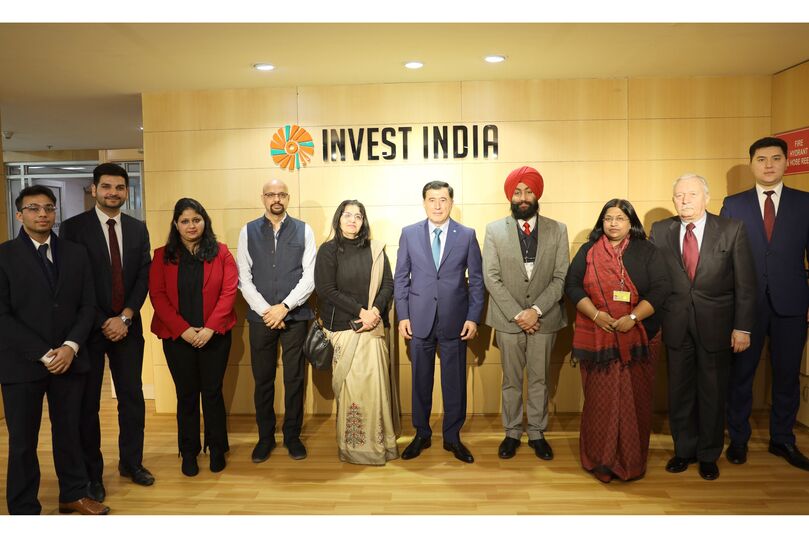On 14 January 2020, SCO Secretary-General Vladimir Norov met with representatives of Indian companies specialising in startups and e-trade at the Indian National Agency for Investment Promotion and Facilitation in New Delhi.
Representatives of Invest India, Startup India, Indian Angel Network, BIRAC and other companies gave presentations.
Nishant Malhotra, who represented Invest India, spoke about Startup India, a company established in 2016 at the initiative of Prime Minister of India Narendra Modi to build an ecosystem for nurturing innovation and startups in India. He said that in order to spread the startup movement around India as quickly as possible, the Indian Government also adopted the Startup India Action Plan 2016, which includes all aspects related to building a startup ecosystem. According to Nishant Malhotra, a website called Startup India Hub (www.startupindia.gov.in) was launched in 40 different languages, including all the SCO languages (English, Russian, Chinese, Kazakh, Kyrgyz, Tajik and Uzbek), to distribute information and exchange knowledge.
In his speech, Co-Head of Startup India Preet Deep Singh noted that a great number of startups had been registered recently in the areas of e-trade, programming, medicine, innovative technologies, finance, logistics and the game industry, with 31 of them becoming unicorns: startups whose value exceeded $1 billion in a short time. He said that now India ranks third after the US and China in startup ecosystem development. Preet Deep Singh also said that partnerships and agreements to create "innovation bridges" have been reached with organisations from over 10 countries, including Russia, Japan, Great Britain, South Korea and Israel.
In his remarks, SCO Secretary-General Vladimir Norov noted that SCO members attach great significance to cooperating in the development of e-commerce and promoting startup initiatives, considering the importance of innovation and the digital economy as the key factors of economic growth. The Secretary-General mentioned that 35 percent of Chinese trade today is conducted via e-commerce and noted China's proposal to launch an International Youth Incubator to develop startups in the SCO space.
Mr Norov informed the meeting participants about the recently adopted SCO documents aimed at promoting these areas: the Concept for Cooperation between the SCO Member States in the Sphere of Digitalisation and Information and Communication Technologies and the New Programme of Multilateral Trade and Economic Cooperation of the SCO Member States until 2035 approved in 2019.
Speaking about the SCO countries' achievements in innovation and e-commerce, Mr Norov stressed that these areas gave a number of undeniable advantages for the economic development in the region.
"First, commercial companies get an opportunity to expand markets for their goods, lower transaction costs and use their capital more effectively. Second, e-commerce creates a lot of new jobs, including in the related areas of the economy, which is especially important for vulnerable populations: women, youth, seniors and disabled people. For example, in China women make up 55 percent of e-commerce employees. Alibaba Group created over 40 million jobs in the past years and plans to create another 100 million by 2036. Third, digital trade encourages people get involved in entrepreneurship. It is known that 63 percent of Indian e-commerce companies belong to novice entrepreneurs," said the SCO Secretary-General.
According to Mr Norov, in this regard the SCO Secretariat is closely cooperating with Alibaba Group in order to implement projects to train and improve the skills of the SCO specialists in digitalisation and e-commerce.
When listing all the advantages of digital trade, the Secretary-General also noted the negative factors concerning the fast development of internet technologies and digitalisation. In order to counter this threat, Vladimir Norov proposed expanding the international legal framework aimed at fighting cybercrime and protecting consumer privacy and rights on the internet.
The SCO Secretary-General recalled that over 800 million people aged 15-24 live in the SCO area, who face the most risks and threats in the information space and noted how important it is to work on forming a "healthy digital culture" in the SCO space and to steer young people's great potential in the right direction by developing their intellectual abilities and youth entrepreneurship in the area of digital and electronic innovations.
"This is why our Organisation focuses on cooperation in ensuring information security, ICT, fighting cybercrime and preventing the spread of terrorist, separatist and extremist ideas via the internet," Vladimir Norov said.
Stressing India's significant potential in the development of information and digital technologies, he noted that the country could assume the key role in the SCO to promote this area and suggested India take an active part in drafting the Action Plan to implement the Concept for Cooperation between the SCO Member States in the Sphere of Digitalisation and Information and Communication Technologies.
In conclusion, the SCO Secretary-General answered questions from the participants.
